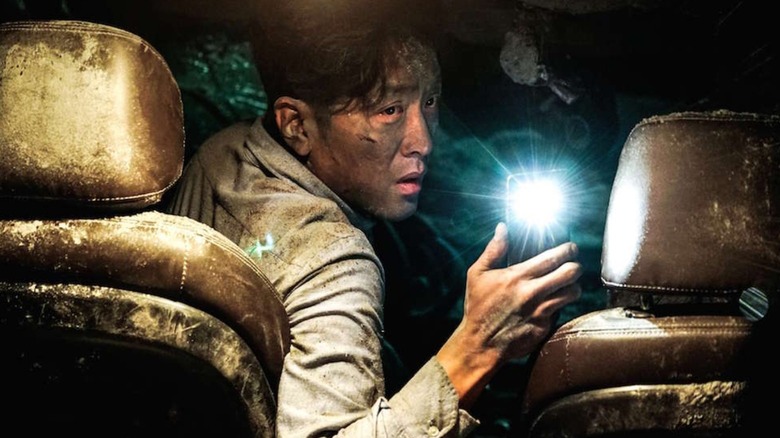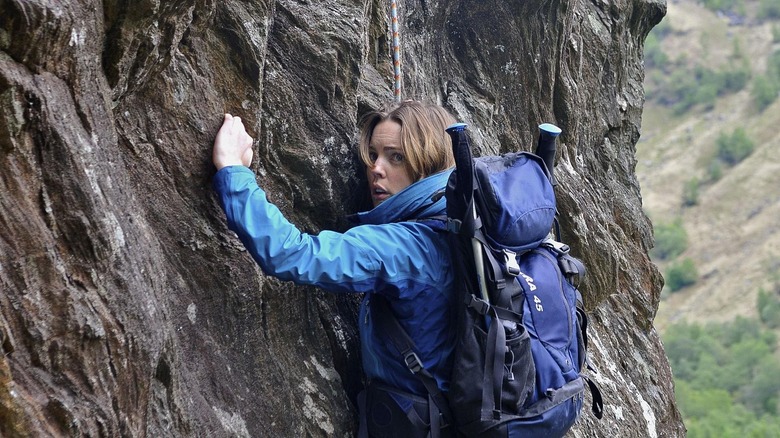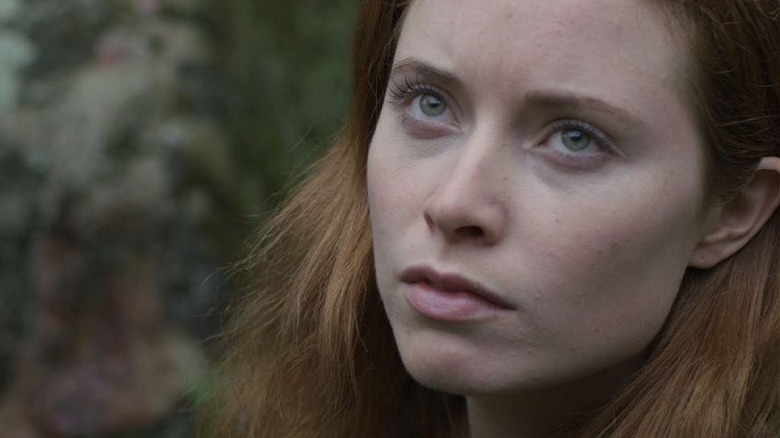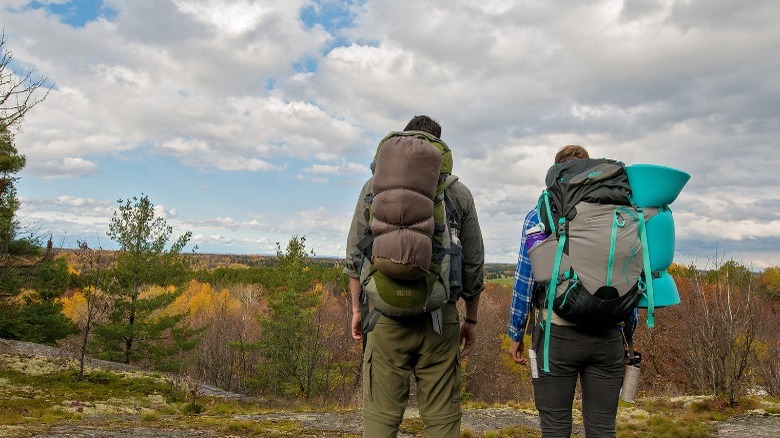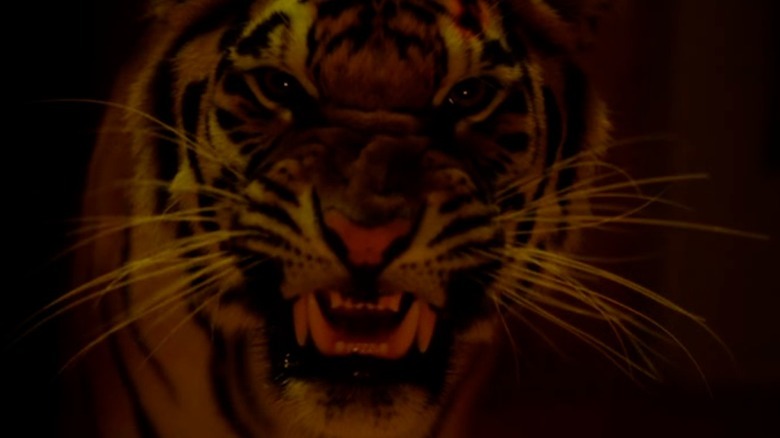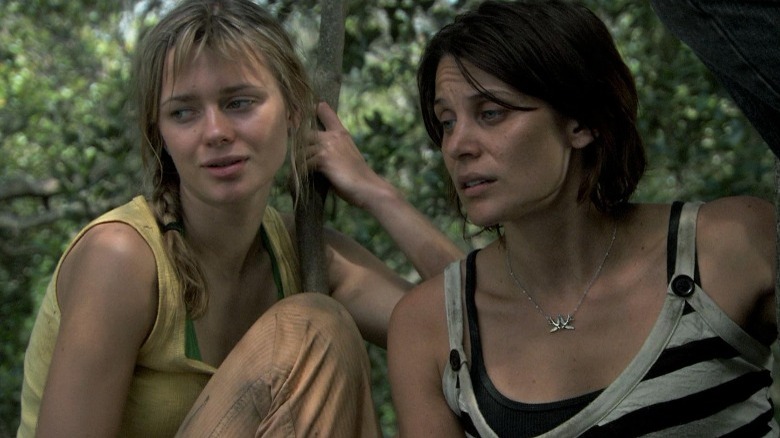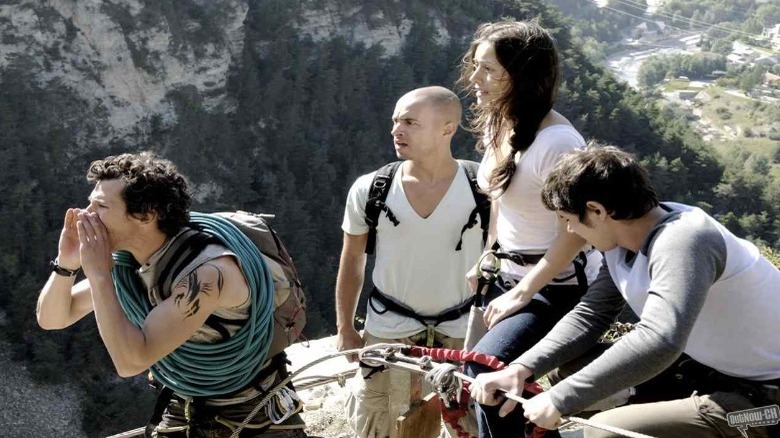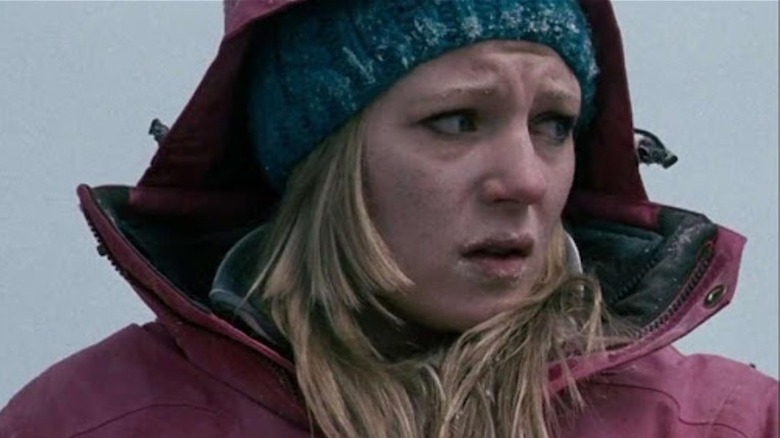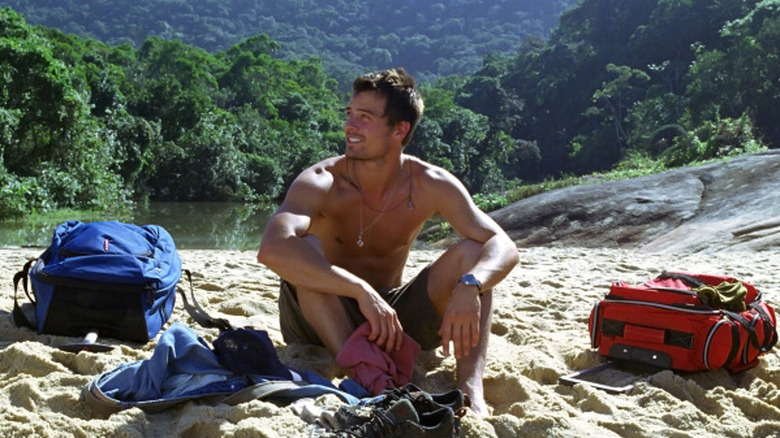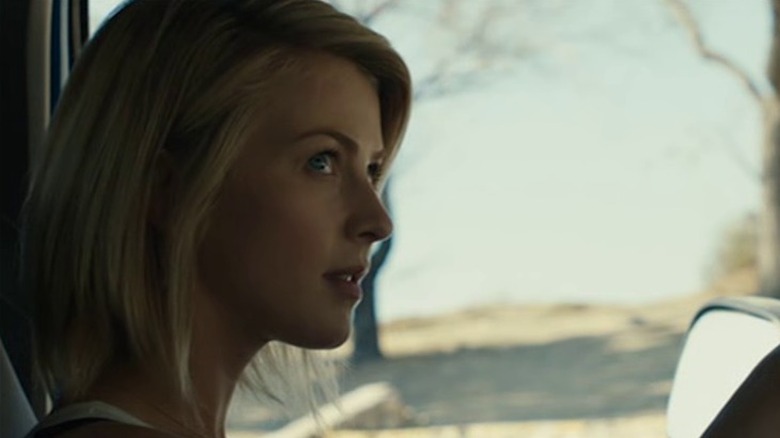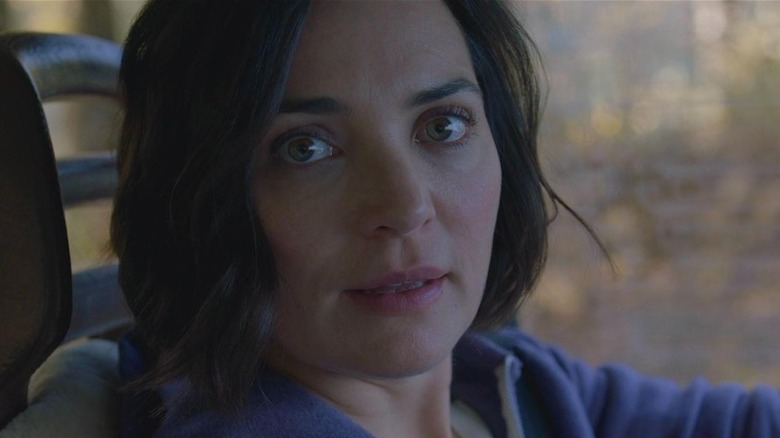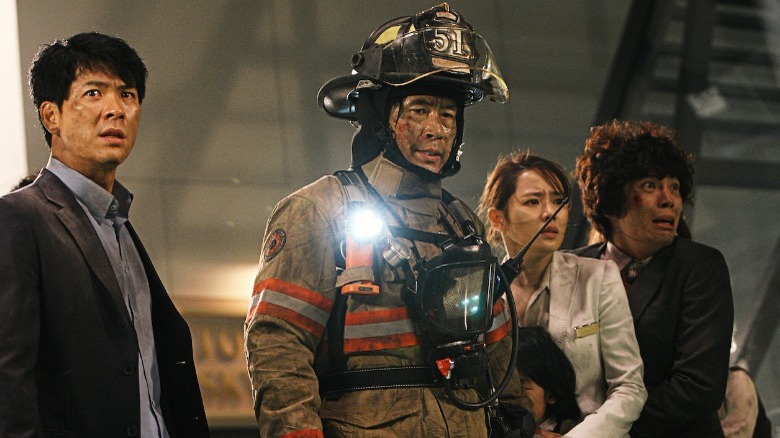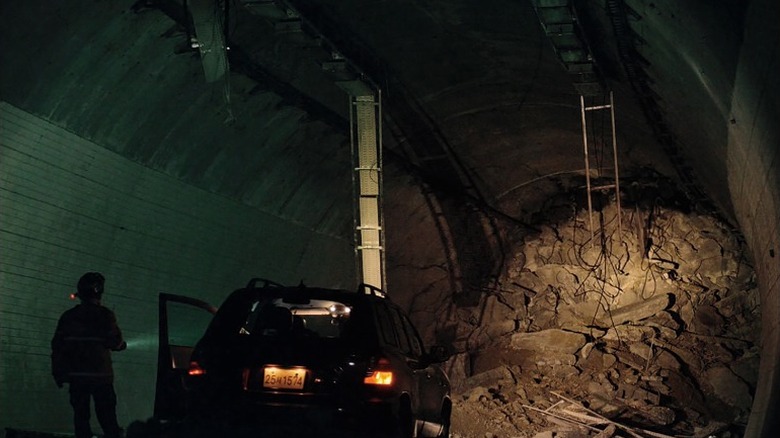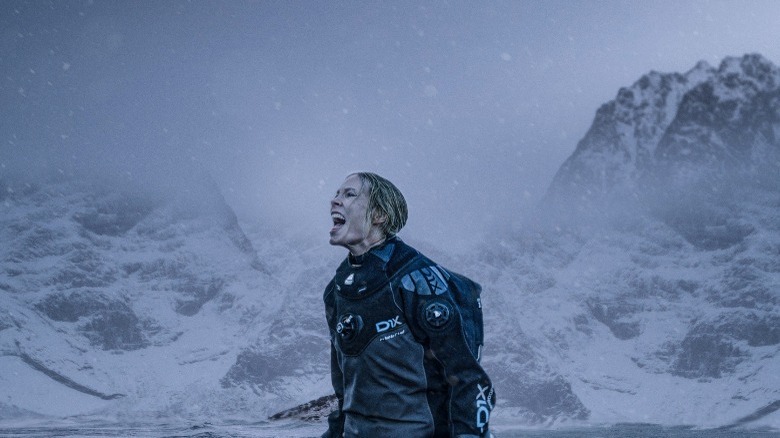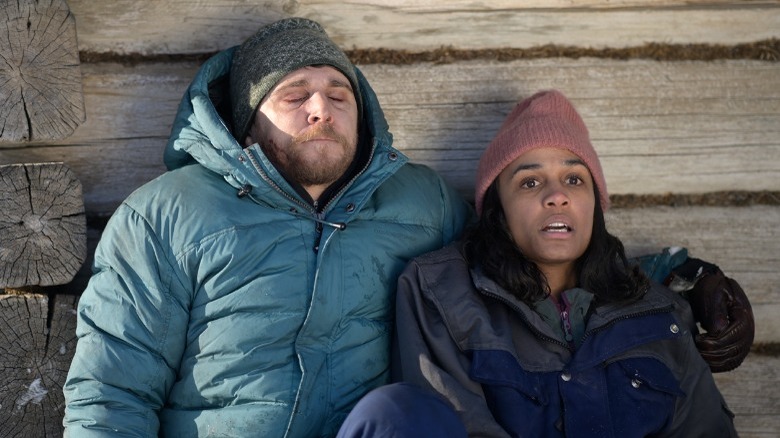Underrated Survival Movies That Will Surely Increase Your Heart Rate
There's nothing quite like watching some poor saps endure the worst of the worst from the comfort of a movie theater auditorium. Against all odds, the survival movie subgenre all but begs audiences to bet on whether a movie's core group of characters will make it to the end. The subgenre itself is vast, with some — such as 2018's "All is Lost" — trading in sentimentality more than survival thrills. Similarly, the likes of "Everest," "127 Hours," and "Into the Wild" match ripped-from-the-headlines true stories with the budgets and pedigree of major studios ("Everest," for instance, has a reported budget of $55 million).
Yet, lying in wait in a chasm below Hollywood glamour is the darker side of survival movies. These are the ones that lean hard into genre themes and violence, the kind that suffocates with tension and subversive thrills. They lack the considerable optimism and against all odds mantra of the preeminent survival thrillers. Instead, they're gritty, grounded, exceptionally tense works. Here are 14 guaranteed to get your blood pumping and heart rate elevated.
A Lonely Place to Die (2011)
Julian Gilbey's "A Lonely Place to Die" should have been the last decade's "Point Break." It's a cool crime thriller with an adrenaline-junkie central conceit. Melissa George stars as Alison, one of five mountain climbers meeting up for some alpinism in the Scottish Highlands. Gilbey's work in the early half is parallel with Neil Marshall's stunningly claustrophobic direction in "The Descent." Before the central threat even arrives, audiences are left breathless as Alison and company scale mountains. Every broken rope or loose footing is cause for tension, and Gilbey delights in disorienting the audience as his cast climbs farther up precarious cliff sides.
While breaking for lunch near the peak of their expedition, however, the five friends discover a young girl (Holly Boyd) held captive in an underground bunker. They are quickly pursued by her captors, tasked not only with rescuing her but finding a way to bring her back down the mountain with them. The action is stellar, the tension suffocating, and against the grim backdrop of bloodied bodies and taut cat-and-mouse thrills, Gilbey leaves room for simple human truths: When asked why they couldn't just leave the girl behind, Alison responds, "Could you leave her in the ground? Could you?"
What Keeps You Alive (2018)
Alongside the likes of "Spiral" (not the "Saw" sequel), Colin Minihan has been a tour-de-force of queer genre features. His first foray was 2018's "What Keeps You Alive," a terrifying, sapphic depiction of love gone wrong. Jackie (Hannah Emily Anderson) and Jules (Brittany Allen) are a young married couple seeking some much-needed respite at Jackie's wooded cabin. Despite it being their first anniversary, neighborly pop-ins reveal to Jules that there's quite a bit she still doesn't know about her wife's life, namely the mysterious circumstances surrounding the death of Jackie's childhood friend, Jenny. While out on a walk together, Jackie ostensibly tells Jules the truth, only to then swiftly shove her over the edge of a cliff.
Jackie believes Jules is dead though she miraculously survives, but not without serious injuries. This is par for the course with Jackie, whose homicidal instincts predate Jules' arrival. A tense cat-and-mouse game ensues, with Jules tending to her injuries while simultaneously outrunning and attempting to outwit Jackie in the vast, open wilderness. It's one of the best survival thrillers in years, all the more so for how quietly groundbreaking its queer elements are.
Backcountry (2014)
"Backcountry," director Adam MacDonald's feature debut, amounts to something akin to the "Jaws" of the vast wilderness. Rather than a shark, MacDonald exploits the innate terror of ravenous, bloodthirsty bears. Though seemingly based on a true story as more horror and horror-adjacent offerings are, it really amounts to, yes, bears do attack people. Yet MacDonald, a well-known name in the horror community, imbues "Backcountry" with the spirit and zest that would define his later, strictly horror offerings such as "Pyewacket" and a season of "Slasher"; "Backcountry" is scary in all the right ways.
Alex (Jeff Roop) intends to take his girlfriend, Jen (Missy Peregrym) camping for the weekend. Unbeknownst to her, he plans to take her to a lake he visited during his childhood to propose. Incredulously, he refuses both a map and navigational help from several rangers, and within days, the pair is lost. Naturally, Jen is furious, and the two saunter back to their tent for a night of simmering tension. In the morning, they're attacked by a black bear. "Backcountry" arguably depicts the best bear attack scene committed to screen (not that there are many), and that alone is worth the price of admission. It's brutal, gory, and scary as all get out. Ultimately, Jen survives and must endure the stark wilderness, injured and alone, while pursued by the same bear. Featuring survival thrills at their best, "Backcountry" shouldn't be missed.
Burning Bright (2010)
Before "Crawl" there was "Burning Bright," director Carlos Brooks' incredulously conceived yet deliciously effective claustrophobic disaster thriller. Kelly (Briana Evigan) is the de facto caretaker of her younger, autistic brother, Tom (Charlie Tahan). Kelly's stepfather, John (Garret Dillahunt), is something of an irresponsible cad who just so happens to trade in big cats. Kelly spends the night at his house with Tom as a hurricane approaches, and wouldn't you know it — someone has released John's new tiger into the house.
With a mix of digital and practical work, the tiger is mostly effective, only occasionally crossing into immersion-breaking territory. What helps the most is Evigan's committed work — she's something of an early Sharni Vinson from "You're Next" — and the way Brooks makes fantastic use of the boarded-up house and the tempest outside to incite tension. The villainous tiger is relentless, crawling through laundry chutes, smashing doors, and pursuing Kelly and Tom without mercy. Alongside "Crawl," it's indisputable evidence that the world needs more hurricane-bound creature features.
Black Water (2007)
Director Andrew Traucki has gone without the recognition he deserves for far too long. Aside from "The Jungle," his singular misstep, he has created a subgenre of his own — austere Australian creature features. His gimmick is often the same: Traucki employs unknown performers, low budgets, and high concepts to scare the bejeezus out of an audience, often swapping either setting or creature for every feature he directs. "The Reef" has tourists pursued by sharks, while "Black Water: Abyss," a quasi-sequel to his feature debut, has spelunkers trapped in an underwater cave with crocodiles. "Black Water," co-directed by David Nerlich, is arguably his strongest work, though, telling a simple story of three tourists who capsize in a mangrove swamp after a giant crocodile attacks their fishing boat.
The three seek refuge in a tree, and in conventional survival fashion, must develop a plan to escape before the croc makes all of them its meal. Using the "Open Water" technique of merging real animal footage with shots of the performers, Traucki and Nerlich manifest a verisimilitude few creature features can match and one not to be missed. It's raw, tense, and grisly, a grounded and terrifying tale of three people pitted against a malicious crocodile, more than comfortable in its own domain.
High Lane (2009)
"High Lane" is a movie viewers are poised to either love or hate. Abel Ferry's French survival, slasher mashup is a clear homage to the likes of Australia's "Wolf Creek" and Norway's "Cold Prey," featuring high-altitude slaughter from a nameless, motiveless killer. However, "High Lane" is also, at times, considerably more grating. The core group of characters is unlikable, the soundtrack irritating, and the central killer is far from unique. There's nothing to distinguish him from sundry other arbitrary slashers.
Yet, there's a simplicity to the setup, and Ferry has the decency to deliver more than his fair share of thrills. After a bridge collapse jeopardizes a mountain climbing trip for a group of friends in Croatia, they realize exhaustion and isolation are the least of their problems. Anton, a mountain-bound poacher, has covered the area in traps, intent on killing every last one of them. Though little here is distinct, it's done well enough aside from some minor foibles. It isn't a classic in any regard, but it's curiously underseen, and for more forgiving viewers. The film might pair nicely with the likes of "A Lonely Place to Die" or "Wrong Turn."
Frozen (2010)
"Frozen" is liable to keep you from ever riding a ski-lift again. Writer-director Adam Green, fresh off the success of "Hatchet" — a genuine classic in the slasher subgenre — shifted gears considerably with "Frozen," a stripped-down survival thriller in its purest form. Emma Bell, Shawn Ashmore, and Kevin Zegers star as three friends looking for one last trip down the mountain before their skiing trip comes to an end. Though the current operator makes note of their ascension, he is relieved of duty, and the new operator misinterprets his request, leaving the three stranded in the air for a long weekend.
The friends must endure bitter cold, a precariously tethered chair, and lift cables that amount to barbed wire. Which, of course, is to say nothing of the ravenous wolves circling beneath them. Though the acting and overall look of "Frozen" imbue it with a low-budget feel that occasionally detracts, the tension is so pure and so palpable, it's guaranteed to make an impact. In other words, for as high a concept as its hook is, "Frozen" is guaranteed to chill you to the bone.
Turistas (2006)
"Turistas" might seem to have more in common with the torture flicks of the early aughts, a movie that, at first glance, fits in nicely with the likes of "Hostel" and "Saw." In all fairness, that isn't entirely unearned on account of the, well, torture and buckets of blood. However, "Turistas" manages some primal survival thrills of its own, quickly distinguishing itself from a ragtag group of similar 2000s gross-out thrillers.
Melissa George and Josh Duhamel star as two of several tourists who quickly become friends while backpacking in Brazil. After they're drugged at a beachside bar and left stranded with no belongings, they run afoul of a local organ harvesting ring and must endure a brutal fight for survival. "Turistas," like "Hostel," occasionally runs the risk of horror xenophobia, the idea that foreign lands and the people therein are innately scary or dangerous. It's a setback, though "Turistas" also manages to do a lot right, namely its stellar use of natural locales, hidden caves, and dense forests to imbue it with both the isolationism and tension of older fish out of water horror tales such as 1970's "And Soon the Darkness." George is especially strong in the lead, and "Turistas" rises above its brethren as one of the best 2000s splatter had to offer.
Curve (2015)
"Curve" is high-concept Blumhouse of the best order. Julianne Hough of "Dancing With the Stars" fame stars as Mallory, a bride-to-be en route to Denver for her wedding rehearsal. She endures the requisite first act survival drama, including hostile family and doubts as to whether she's ready to be married. It matters naught, however, after her car breaks down and a supposedly friendly man, Christian (Teddy Sears), offers to help her fix it. He does so successfully, and feeling a duty to repay his kindness, Mallory offers Christian a ride. Bad call.
As Christian's behavior descends into frightening, Mallory crashes the car, only to find herself pinned beneath it in a ditch. Christian, however, frees himself and spends the next several days taunting her. Hough, despite her limited screen credits, impresses, as does director Iain Softley's use of claustrophobic blocking and Ed Shearmur's propulsive soundtrack. The combination makes "Curve" the perfect Friday night rental for a more sadistically inclined survival crowd.
Alone (2020)
John Hyams' "Alone" is arguably one of the scariest movies released in 2020. A film that reduces the daily fight-or-flight survival of a single woman into an absolutely punishingly tense exercise in terror, "Alone" terrifies because it feels all too real. Jessica (Jules Wilcox) is a recent widow moving across the country. En route to her new destination, she continues to encounter the same mysterious man (Marc Menchaca) everywhere she goes. He's on the road trailing her, stopped at the same gas station she is, and even loitering around a motel where she's stopped to rest.
The early third of "Alone" is just this. Jessica arrives somewhere, spots the man, and grapples with the cultural gaslighting that's jeopardized her safety. She possesses a unique capacity to recognize something is wrong, though she's prohibited from saying anything to anyone. Who, in other words, would believe her? Jessica's instincts prove correct, however, because after she crashes on account of a mysterious slashed tire, the man appears, drugs her, and locks her away in a cabin basement. The cat-and-mouse games escalate as Jessica braves a dangerous wilderness to escape her captor, lest she risk being caught and returned to whatever horrors he has in store for her. It's stripped-down survival thrills at their best, rendered all the more effective on account of its terrifying prescience.
The Tower (2012)
"The Tower" has likely eluded recognition because, outside of South Korea, it sort of trickled onto international VOD platforms without much fanfare. This is to say, short of IMDb identifying it as a suggested watch, audiences would be forgiven for simply not knowing it exists. That's a shame, since "The Tower" is what The Rock vehicle "Skyscraper" could have been.
A South Korean riff on "The Towering Inferno," a helicopter sprinkling snow over an extravagant Christmas Eve party atop Tower Sky, a massive new luxurious complex in Yeouido, Seoul, crashes into the building after a huge gust of wind sends it spinning. The other copters follow suit, and soon, Tower Sky is up in flames. Floors collapse, glass shatters, and infernos snake through the entire 120-story building. A group of survivors — almost all of whom, in some capacity or another, questioned the safety of Tower Sky — must make their way out of the building before it collapses entirely. Told alongside the group of firefighters looking to contain the blaze, "The Tower" has everything fans of survival-oriented disaster movies expect. The effects are stellar, the characterization poignant (if a little saccharine), and the set pieces exceptional. It's never not fun to watch fuel leak into an elevator and question how the heck anyone plans to get out of this mess.
Tunnel (2016)
"Tunnel" is infuriating in the best possible way. The conceit for Kim Seong-hun's South Korean survival drama is simple: Lee Jung-soo (Ha Jung-woo) is driving home for his daughter's birthday party. He's got a cake in tow and several reminders from his wife not to miss it, clearly foreshadowing that, yeah, Jung-soo is going to miss it. While traveling through a mountainside tunnel, the roof collapses, trapping Jung-soo and a handful of other drivers within. Luckily, his cell phone survives the collapse, and he has both some water and his daughter's cake available.
A tense infrastructure debate ensues on the surface, with public opinion split between the enormous cost of rescuing Jung-soo — which also comes at the cost of delaying completion on another nearby tunnel — and the innate value of his life, a position championed by his wife, Se-hyun (a sensational Bae Doona). With a mixture of biting political commentary, infuriating bureaucratic ineptitude, and a genuinely moving story of survival, "Tunnel" transcends its basic title as one of the best survival thrillers of this century.
Breaking Surface (2020)
"Breaking Surface" parallels best with "Tunnel" in that it isn't an especially action-packed survival thriller. Instead, after the inciting disaster, director Joachim Hedén lets strong acting and character work propel his narrative forward. Half-sisters Ida (Moa Gammel) and Tuva (Madeleine Martin) take annual winter diving trips together in northern Norway. At first, their trip is going to plan. It's just the two of them, requisite gear in tow, diving to the frozen depths of a remote sea. A rock collapse, though, soon traps Tova against the bottom of the ocean, 30 meters below the surface.
From there, and with no hope of outside help, it's up to Ida's quick wits and survival mettle to free her sister before one or both of them succumb to the elements. Hedén works wonders here, allowing his two actresses to carry the show while remaining grounded in how the narrative unfurls. Neither are quick to histrionics or proclamations of depth. Almost methodically, Ida works through every plan she can think of, some working better than others, all within the realm of the real world, not fictional moviemaking. It's a survival movie that relies on remaining measured and realistic, and for that, it's all the easier to be chilled by how hopeless the situation often seems.
Red Dot (2021)
Netflix has been both a blessing and a curse to the film industry. On one hand, it has increased, in some capacity, access for filmmakers to tell the stories they really want to tell. The sheer number of titles available, many of which hail from places that once struggled to find considerable distribution in the West, is astounding. On the other hand, that same magnitude of available titles means a movie has, at most, a single day of dominating the zeitgeist before it slips into obscurity, flanked by rows of other long-forgotten Netflix titles.
Such was the case with "Red Dot," Alain Darbor's Swedish-language survival thriller about a couple, David and Nadja (Anastasios Soulis and Nanna Blondell respectively), and their trip to see the Northern Lights. Nadja is secretly pregnant, and with their relationship already on the fritz, tension is high — if only that's all they had to worry about. One evening while camping, they awake to find a strange red dot projected on them from the distance. Assuming it's a prank, a gunshot rings out and shocks them to their senses as they realize it's a rifle's laser sight. In the blistering cold, David and Nadja endure a brutal fight for survival, unsure of who is targeting them and why they would be. The movie is bone-chilling, expertly crafted, and tightly wound. Set your sights on this one.
